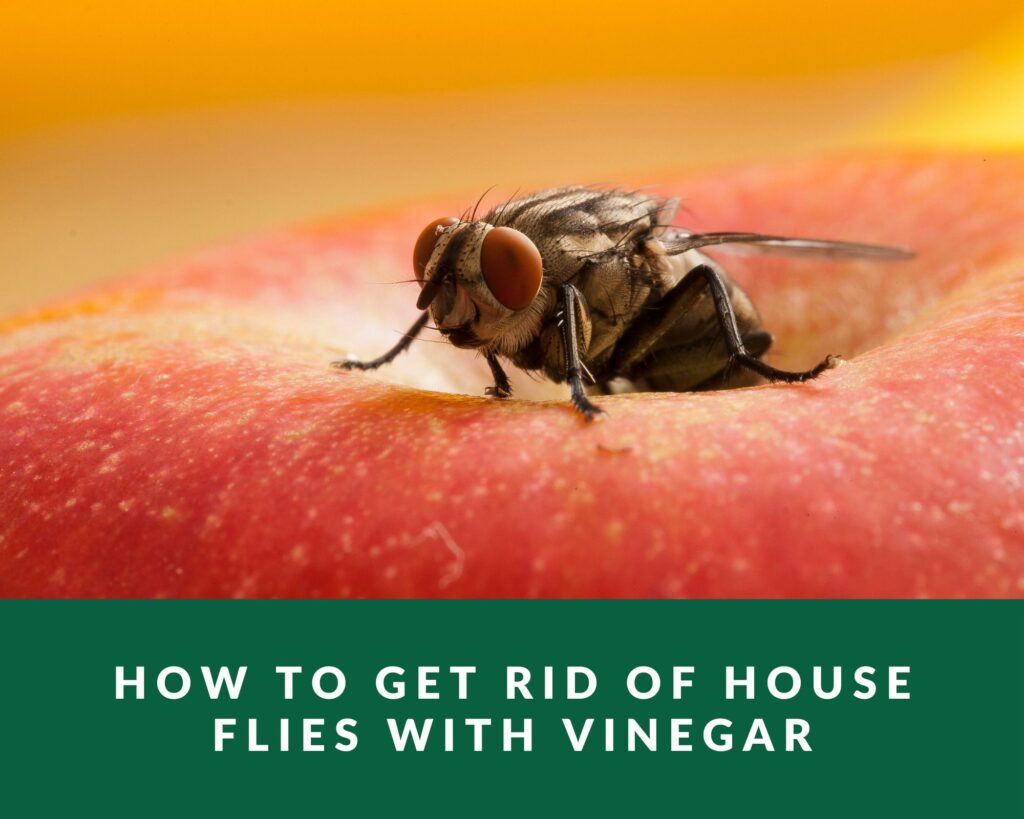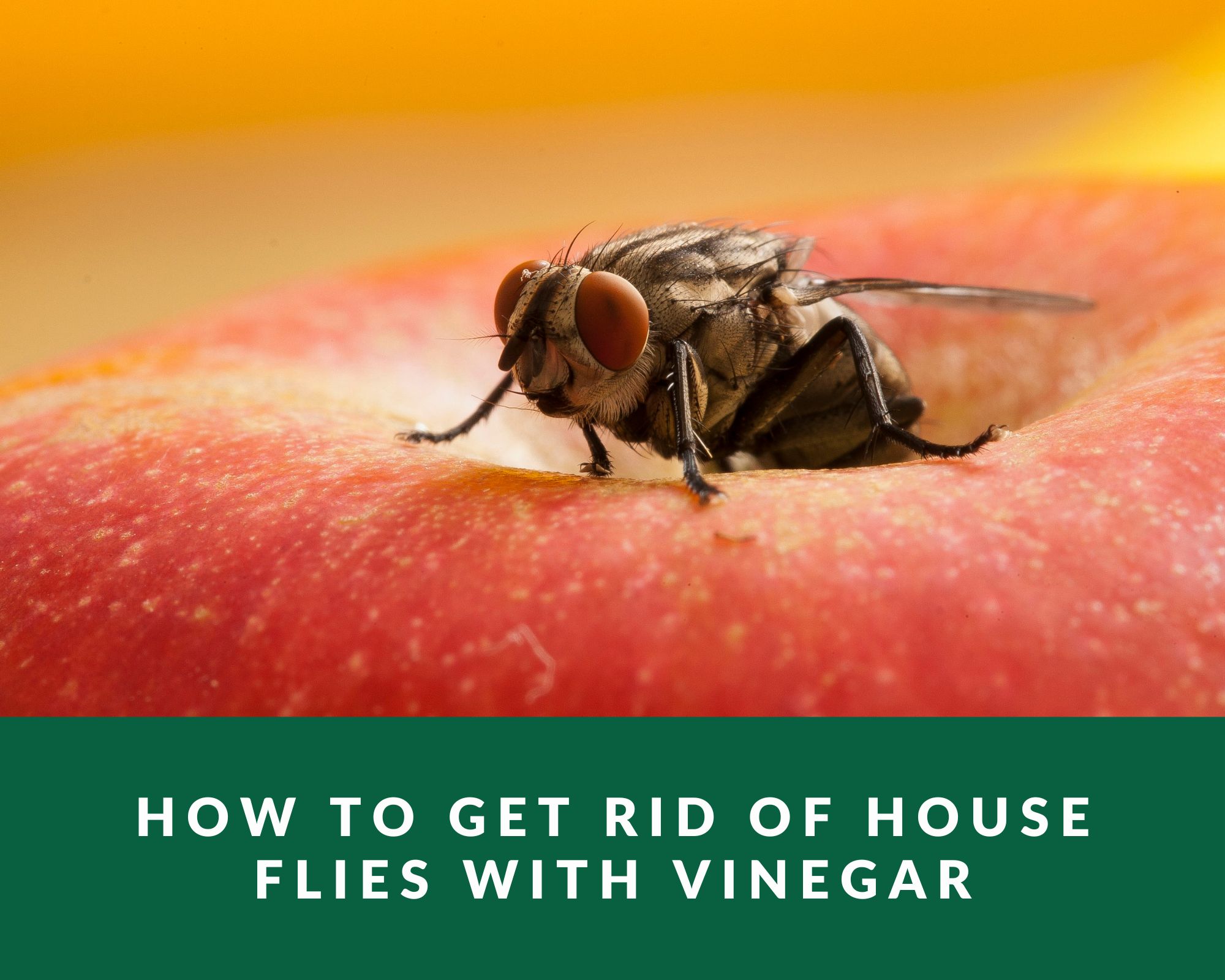Houseflies are still an issue wherever decomposing organic waste and litter are allowed to develop, presenting a significant health risk and discomfort in urban areas. Is it really possible to get rid of house flies with vinegar?

What are Vinegars
Vinegar otherwise known as “Acetic acid” is an aqueous mixture of trace chemicals, such as flavorings and then acetic acid. Acetic acid normally makes up 5-8% of the volume of vinegar. Typically, ethanol is created by fermenting simple carbohydrates with yeast, and acetic acid bacteria then convert ethanol to acetic acid.
A widespread insect from the Muscidae family is the housefly (Musca domestica) (order Diptera). Houseflies make up around 90% of all flies found in human dwellings.
Quick facts about house flies
The mature housefly has longitudinal lines on the thorax and an abdomen with dirty-yellowish patches. The body size varies between 5 and 7 mm (0.2 and 0.3 inches), and the large compound eyes contain roughly 4,000 facets.
The housefly cannot bite due to its lapping or sponging mouthparts; in contrast, the stable fly, a close relative, can. Nonetheless, they have the ability to spread more than 100 different infections, such as tuberculosis, typhoid, and salmonellosis.
House flies carry disease germs they take up on their legs and mouths while eating on trash, dung, and other decaying materials, contaminating food surfaces. Additionally, they frequently defecate.
Life Cycle of House flies
The female lays between 600 and 1,000 slender, pale eggs, each measuring 0.8 to 1 millimeters in length, at a time. In 12 to 24 hours, these eggs will hatch. The 12 mm long dirty-whitish larvae (larvae), which have undergone multiple molts, eventually become pupae. When fully grown, the adults stretch a pouch on their heads sever the puparium’s end to come out.
Getting rid of house flies with vinegar
Vinegar is an excellent natural way to get rid of house flies. The vinegar can be used as a direct spray or mixed with water in a spray bottle.
Direct method
- Mix 1 part vinegar with 3 parts water in a spray bottle.
- Spray the mixture on the house fly or on the area where they are seen most frequently.
- The vinegar will kill them immediately, but it takes longer for their bodies to dissolve into the liquid than with other methods of killing house flies such as alcohol or soap solutions.
Spray bottle method
- Mix 1 part vinegar with 3 parts water in a spray bottle and shake well until combined completely.
- Spray the mixture on any areas where you see house flies as well as along any pathways where they may be traveling between rooms or areas in your home.
DIY house-fly vinegar and dish wash traps
You’d need:
- Apple Cider Vinegar
- Dish Soap
- A Tall Glass
- Plastic Wrap
- Rubber Band
- Toothpick
Directions
- Pour half apple cider vinegar into a glass and the add half of dish soap.
- Put a rubber band around the glass mouth and wrap it in plastic wrap.
- Using a toothpick, poke a few holes throughout the wrap.
- Place the trap there, and then leave it there for at least 24 hours.
Note: No trap is impenetrable. Many flies might slither close to the vinegar mixture but not inside of it, and they might also become somewhat lethargic. Avoid moving the trap since the vibrations from your touch could trigger even lethargic insects to escape. Leave the trap alone and try to grab the sluggish flies that are now flying around with the extension wand on your vacuum.
Before, During, and After
Remove food sources by cleaning dishes, emptying the garbage disposal, taking away the trash, and doing everything else you can while you wait for the flies to fall in the trap. Make the apple cider vinegar their only source of nourishment.
Remember that the present flies may have already begun reproducing, so if you see a few more over the next several days, don’t be worried. Continue to maintain a clean environment and set traps. However, if the infestation persists for a number of days, you risk having flies nesting outside, close to your home, or in drains.
Conclusion
You should be able to use vinegar to get rid of house flies in your home if you implement the recommendations discussed above. To stop the flies from being drawn to your home in the first place, it’s crucial to always remember to clean up after.
Although vinegar can help kill existing flies in your home, it won’t stop new ones from entering. It’s important to keep in mind that killing the flies takes time. You must use vinegar consistently if you have a house fly infestation. Use it constantly until all the flies are gone.

